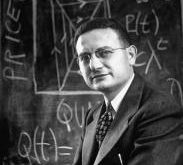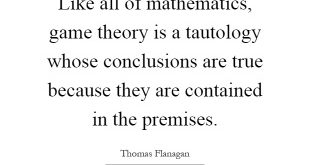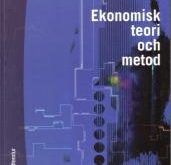from Lars Syll Paul Samuelson claimed that the ‘ergodic hypothesis’ is essential for advancing economics from the realm of history to the realm of science. But is it really tenable to assume that ergodicity is essential to economics? The answer can only be — as I have argued here here here here and here — NO WAY! Obviously yours truly is far from the only researcher being critical of Paul Samuelson. This is what Ole Peters writes in a highly interesting article on Samuelson’s stance on...
Read More »Thought experiment: Radical abundance
from Jason Hickel Imagine if we were to even just partially decommoditize London’s housing stock; for example, imagine the government was to cap the price of housing at half its present level. Prices would still be outrageously high, but Londoners would suddenly be able to work and earn significantly less than they presently do without any loss to their quality of life. Indeed, they would gain in terms of time they could spend with their friends and family, doing things they love,...
Read More »Robert Reich suggests 5 ways to abolish billionaires
from Ken Zimmerman Robert Reich suggests that one thing we could do to deal with these problems is to abolish billionaires. Robert, lays out the ways billionaires are able to accumulate that much money. First, monopoly. We can address this by vigorously enforcing anti-trust laws already on the books. Second, copyrights and patents. Robert suggests shortening these by half or more. Third, insider information. Here we need to both enforce fines to take away all the money gotten in this way,...
Read More »Time
from Lars Syll [embedded content] Time is what prevents everything from happening at once. To simply assume that economic processes are ergodic and concentrate on ensemble averages — and hence in any relevant sense timeless — is not a sensible way for dealing with the kind of genuine uncertainty that permeates real-world economies. Ergodicity and the all-important difference between time averages and ensemble averages are difficult concepts — so let me try to explain the meaning of these...
Read More »MMT Macro Final Exam (1/3)
from Asad Zaman During the last two semesters, I taught Macroeconomics based on a new approach which re-incorporate the history that Economists forgot (See Method or Madness?). The central idea of the course is that economic theories cannot be understood outside of their historical context. Conversely, economic history cannot be understood except by studying the economic theories (right or wrong) which were used by contemporaries to shape policy responses to historical events. The...
Read More »The lurking dangers in the internet of money
from C. P. Chandrasekhar Facebook has launched a process that would lead to the creation of a new cryptocurrency, “Libra”, in the first half of 2020. Named after a unit of weight used in ancient Rome, Facebook hopes Libra would become the dominant measure of value for transactions, at least on the internet. As is characteristic of the world of digital business that, outside of finance, has delivered the largest number of billionaires in recent decades, the creation of libra is presented...
Read More »Game theorists — people carried away by fictions
from Lars Syll Applied game theory is a theory of real-world facts, where we use game theoretical definitions, axioms, theorems and (try to) test if real-world phenomena ‘satisfy’ the axioms and the inferences made from them. When confronted with the real world we can (hopefully) judge if game theory really tells us if things are as postulated by theory. But there is also an influential group of game theoreticians that think that game theory is nothing but pure theory, an...
Read More »So much for “conservative” economics and economists.
from Ken Zimmerman In 1771 a former barber and wig maker, Richard Arkwright, opened the world’s first water-powered spinning mill at Cromford in Derbyshire. He employed 600 workers, mainly children, who could do the work of ten times that number of hand spinners. In 1775 a Scottish mathematical instrument maker, James Watt, joined forces with the Birmingham engineer Matthew Boulton to produce steam engines which could turn machinery, haul enormous loads and, eventually, propel ships and...
Read More »Differential inflation and full enclosure
from Ikonoclast After reading “Capital as Power” by Bichler and Nitzan, where they talk about differential accumulation, a key and salient point about our economy appears to me to be a regime of differential inflation. Clearly, differential inflation can enable differential accumulation. Economists often talk about economies as if one average inflation rate affects the entire economy. This does not seem to me to capture the situation at all. The modern (neoliberal / monetarist) economy is...
Read More »What can we learn from economic models?
from Lars Syll Some economic methodologists have lately been arguing that economic models may well be considered ‘minimal models’ that portray ‘credible worlds’ without having to care about things like similarity, isomorphism, simplified representationality or resemblance to the real world. These models are said to resemble ‘realistic novels’ that portray ‘possible worlds’. And sure: economists constructing and working with that kind of models learn things about what might happen in those...
Read More » Real-World Economics Review
Real-World Economics Review




